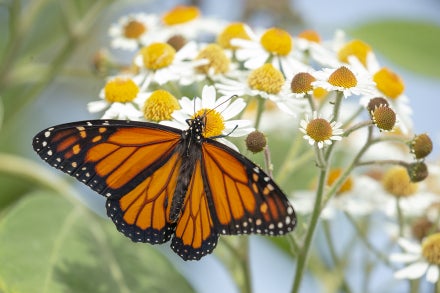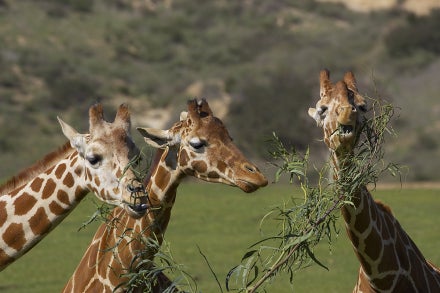Image

Zoo InternQuest is a seven-week career exploration program for San Diego County high school juniors and seniors. Students have the unique opportunity to meet professionals working for the San Diego Zoo, Safari Park, and Institute for Conservation Research, learn about their jobs, and then blog about their experience online. Follow their adventures here on the Zoo’s website!
 Have you ever been to the Zoo and seen the elephants? Have you ever thought about how your day to day actions might be affecting these wild animals? Like many of you blog readers, I have always gone to the Zoo looking forward to seeing the elephants but I never processed how my actions could be affecting the survival of the elephant species.
During our second week of Zoo InternQuest, we spoke to Ms. Victoria Dunch, a Research Associate who teaches groups of students at the Institute for Conservation Research what the Institute does in terms of global conservation of endangered species. Ms. Dunch’s focused on African elephant’s reproduction at the Safari Park. Unfortunately, wild African elephant populations are declining at a rate of 8% every year. It is estimated that there are only 350,000 wild elephants remaining in Africa.
The decline of the African elephant is due to three factors: poaching, human-wildlife conflict, and habitat loss. Unfortunately, poachers kill the elephants for their ivory tusks. Even though ivory is commonly mistaken for having medicinal properties, it is just made out of dentine, which is the same as our teeth. Also, when most people think of poaching, people think of far off places like Africa and Asia. Even though this is true, the United States is the second largest importer of illegally poached ivory.
Ms. Dunch’s role in conservation at the Institute is to educate middle and high school students through interactive programs that focus on the many conservation projects happening at the Institute inlcuding elephant reproduction. With our group, we conducted an ELISA of progesterone levels in female elephants to determine pregnancy. This test used different colors to determine the levels of progesterone in each sample. By determining the varying levels of progesterone in the samples, researchers are able to tell when an elephant is cycling or pregnant.
Now saving the elephants isn’t just the Zoo and Safari Park’s responsibility; it is on all of us! Ways the average Joe can help in keeping the elephants on this planet are not buying ivory, and researching brands that use sustainable palm oil. Almost all products contain palm oil, but if you reward the good behavior of some companies and stop buying from the bad ones, all companies with have to shift. There is an app called Cheyenne Mountain Zoo Palm Oil that allows you to scan products at the grocery store to see if they are using sustainable palm oil.
Tara, Conservation Team
Week Two, Fall Session 2017
Have you ever been to the Zoo and seen the elephants? Have you ever thought about how your day to day actions might be affecting these wild animals? Like many of you blog readers, I have always gone to the Zoo looking forward to seeing the elephants but I never processed how my actions could be affecting the survival of the elephant species.
During our second week of Zoo InternQuest, we spoke to Ms. Victoria Dunch, a Research Associate who teaches groups of students at the Institute for Conservation Research what the Institute does in terms of global conservation of endangered species. Ms. Dunch’s focused on African elephant’s reproduction at the Safari Park. Unfortunately, wild African elephant populations are declining at a rate of 8% every year. It is estimated that there are only 350,000 wild elephants remaining in Africa.
The decline of the African elephant is due to three factors: poaching, human-wildlife conflict, and habitat loss. Unfortunately, poachers kill the elephants for their ivory tusks. Even though ivory is commonly mistaken for having medicinal properties, it is just made out of dentine, which is the same as our teeth. Also, when most people think of poaching, people think of far off places like Africa and Asia. Even though this is true, the United States is the second largest importer of illegally poached ivory.
Ms. Dunch’s role in conservation at the Institute is to educate middle and high school students through interactive programs that focus on the many conservation projects happening at the Institute inlcuding elephant reproduction. With our group, we conducted an ELISA of progesterone levels in female elephants to determine pregnancy. This test used different colors to determine the levels of progesterone in each sample. By determining the varying levels of progesterone in the samples, researchers are able to tell when an elephant is cycling or pregnant.
Now saving the elephants isn’t just the Zoo and Safari Park’s responsibility; it is on all of us! Ways the average Joe can help in keeping the elephants on this planet are not buying ivory, and researching brands that use sustainable palm oil. Almost all products contain palm oil, but if you reward the good behavior of some companies and stop buying from the bad ones, all companies with have to shift. There is an app called Cheyenne Mountain Zoo Palm Oil that allows you to scan products at the grocery store to see if they are using sustainable palm oil.
Tara, Conservation Team
Week Two, Fall Session 2017
 Have you ever been to the Zoo and seen the elephants? Have you ever thought about how your day to day actions might be affecting these wild animals? Like many of you blog readers, I have always gone to the Zoo looking forward to seeing the elephants but I never processed how my actions could be affecting the survival of the elephant species.
During our second week of Zoo InternQuest, we spoke to Ms. Victoria Dunch, a Research Associate who teaches groups of students at the Institute for Conservation Research what the Institute does in terms of global conservation of endangered species. Ms. Dunch’s focused on African elephant’s reproduction at the Safari Park. Unfortunately, wild African elephant populations are declining at a rate of 8% every year. It is estimated that there are only 350,000 wild elephants remaining in Africa.
The decline of the African elephant is due to three factors: poaching, human-wildlife conflict, and habitat loss. Unfortunately, poachers kill the elephants for their ivory tusks. Even though ivory is commonly mistaken for having medicinal properties, it is just made out of dentine, which is the same as our teeth. Also, when most people think of poaching, people think of far off places like Africa and Asia. Even though this is true, the United States is the second largest importer of illegally poached ivory.
Ms. Dunch’s role in conservation at the Institute is to educate middle and high school students through interactive programs that focus on the many conservation projects happening at the Institute inlcuding elephant reproduction. With our group, we conducted an ELISA of progesterone levels in female elephants to determine pregnancy. This test used different colors to determine the levels of progesterone in each sample. By determining the varying levels of progesterone in the samples, researchers are able to tell when an elephant is cycling or pregnant.
Now saving the elephants isn’t just the Zoo and Safari Park’s responsibility; it is on all of us! Ways the average Joe can help in keeping the elephants on this planet are not buying ivory, and researching brands that use sustainable palm oil. Almost all products contain palm oil, but if you reward the good behavior of some companies and stop buying from the bad ones, all companies with have to shift. There is an app called Cheyenne Mountain Zoo Palm Oil that allows you to scan products at the grocery store to see if they are using sustainable palm oil.
Tara, Conservation Team
Week Two, Fall Session 2017
Have you ever been to the Zoo and seen the elephants? Have you ever thought about how your day to day actions might be affecting these wild animals? Like many of you blog readers, I have always gone to the Zoo looking forward to seeing the elephants but I never processed how my actions could be affecting the survival of the elephant species.
During our second week of Zoo InternQuest, we spoke to Ms. Victoria Dunch, a Research Associate who teaches groups of students at the Institute for Conservation Research what the Institute does in terms of global conservation of endangered species. Ms. Dunch’s focused on African elephant’s reproduction at the Safari Park. Unfortunately, wild African elephant populations are declining at a rate of 8% every year. It is estimated that there are only 350,000 wild elephants remaining in Africa.
The decline of the African elephant is due to three factors: poaching, human-wildlife conflict, and habitat loss. Unfortunately, poachers kill the elephants for their ivory tusks. Even though ivory is commonly mistaken for having medicinal properties, it is just made out of dentine, which is the same as our teeth. Also, when most people think of poaching, people think of far off places like Africa and Asia. Even though this is true, the United States is the second largest importer of illegally poached ivory.
Ms. Dunch’s role in conservation at the Institute is to educate middle and high school students through interactive programs that focus on the many conservation projects happening at the Institute inlcuding elephant reproduction. With our group, we conducted an ELISA of progesterone levels in female elephants to determine pregnancy. This test used different colors to determine the levels of progesterone in each sample. By determining the varying levels of progesterone in the samples, researchers are able to tell when an elephant is cycling or pregnant.
Now saving the elephants isn’t just the Zoo and Safari Park’s responsibility; it is on all of us! Ways the average Joe can help in keeping the elephants on this planet are not buying ivory, and researching brands that use sustainable palm oil. Almost all products contain palm oil, but if you reward the good behavior of some companies and stop buying from the bad ones, all companies with have to shift. There is an app called Cheyenne Mountain Zoo Palm Oil that allows you to scan products at the grocery store to see if they are using sustainable palm oil.
Tara, Conservation Team
Week Two, Fall Session 2017



